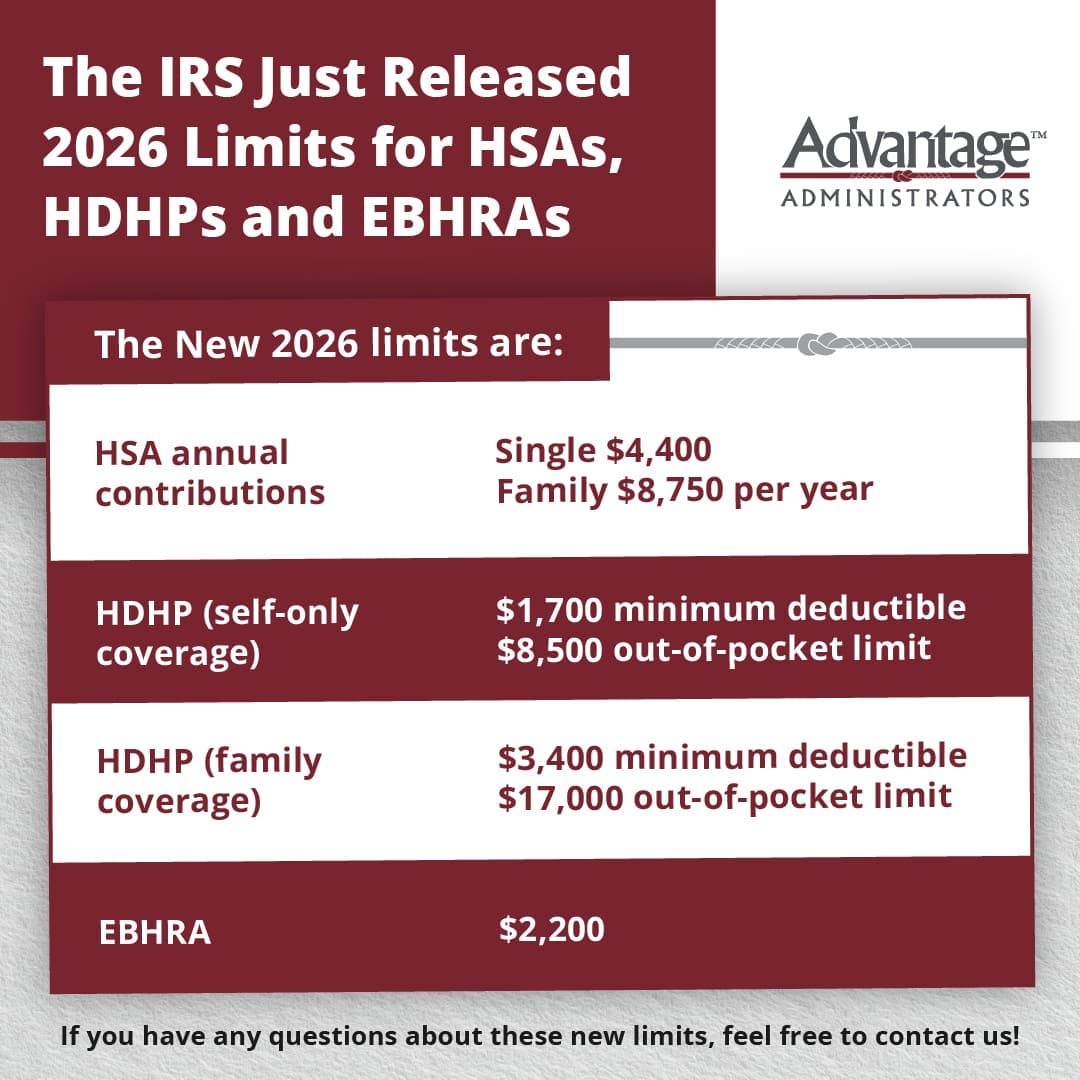The Best Way to Save for Retirement
Saving for retirement is critical, but sometimes the array of options available can feel overwhelming. Should you make contributions to this account? Or that one? How much? For how long? And when can you start receiving distributions? Will they be taxed?
That’s a lot of questions, but we have the answers! The retirement professionals at Advantage Administrators are here to help you understand the differences between HSAs, 401(k)s, and IRAs and to create a retirement savings plan that fits your life and retirement goals. Keep reading to get started!
HSA
An HSA, or health savings account, is a savings tool that allows employees or individuals to make tax-free contributions and save toward health expenses. Distributions to pay for those costs (as long as they are expenses that qualify for an HSA) are also nontaxable. Money in your account is invested, and thus can grow over time tax-free—providing a triple tax benefit!
Interested in setting up an HSA? Here’s what you need to know:
- To be eligible, you must:
- Enroll in a qualified high-deductible health insurance plan; and
- Open an HSA with a variety of entities, including banks, credit unions or financial advisors such as Advantage Administrator. And when you work with Advantage, you can expect excellent customer service, our convenient Benefits Mobile App, and much more!
- In 2019, individuals can contribute up to $3,500, while families can put $7,000 into their HSA
- Your contributions are tax-deductible
- Distributions for qualifying medical expenses are not taxable or subject to penalty and can be used by those 65 and older for any purpose
HSAs offer a lot of benefits, and if you want a way to save for and spend on qualified medical expenses tax-free while also investing for the future, then it may be a great option for you. It’s also important to assess your personal health situation, including potential upcoming procedures, to determine how and when your HSA will be used. If you may have a significant amount of medical spending, you will want to consider establishing another retirement account such as a 401(k) or IRA.
401(k)
Contributing to a 401(k) can be another excellent retirement option. These accounts are offered through your employer, who can also choose to match your contributions. One benefit of a 401(k) is that it allows you to make significantly higher regular contributions than are available to those just contributing an HSA or IRA.
If you have a 401(k), you need to know these rules:
- Your employer must offer a 401(k)
- Individuals can contribute up to $19,000 in 2019, with $25,000 contributions available for employees age 50+
- Your contributions are not taxable, although your distributions are
- No penalties will be assessed for distributions made after age 59 ½ (with a 10 percent penalty made on gross income for distributions made before this age)
Should you set up a 401(k)? With a current high annual contribution level (increased once you reach 50), participants can make a significant impact when it comes to their retirement savings. The option to contribute to a 401(k) depends also on whether one is offered by your employer; you will also need to carefully plan your future distributions so as to minimize the tax consequences to you.
IRA
IRAs are set up through a retirement advisor or other financial institution, with two IRAs often used as primary retirement vehicles: traditional and Roth IRAs. These investment vehicles, which are set up with a bank, financial advisor, or other financial entity, allow participants to grow wealth, with significant differences among them in savings and tax effects. Here’s how both IRAs operate:
- Your contributions can be $6,000 for those under 50, or $7,000 when over that age
- 10 percent penalties (and inclusion in your gross income) will be assessed on withdrawals taken before age 59 ½
Here’s some key differences between the two types of IRAs:
- Traditional IRAs:
- Only those under age 70 ½ with taxable compensation can contribute
- Contributions can be deducted on your taxes if your income is not above certain levels, even if you or your spouse have a retirement plan at work. In that case, your deduction will be limited, however no limitation will occur if neither of you have an employer-based retirement plan. The income levels include:
- For people filing singly: those with modified adjusted gross incomes (AGI) of $137,000 or less (with contributions phasing out at $122,000)
- For married couples filing jointly: an AGI below $203,000 is required (with phase-out starting at $193,000)
- You will be taxed when distributions are made to you
- Roth IRAs:
- Contributions are allowed regardless of age if the income levels referenced above are met.
- Your contributions are subject to taxation.
- You can receive distributions from your Roth IRA and a tax deduction will be allowed if you qualify:
- Distributions are taken after five years following your first contribution to the Roth IRA; and
- You take the distribution due to any of the following:
- You are disabled
- The distribution is made to a beneficiary upon your death
- You are 59 ½ or older
- You use the money (up to $10,000) to buy your first home
As you can see, traditional and Roth IRAs have different eligibility, contribution, and withdrawal rules, especially when it comes to tax deductions. When evaluating each, it’s important to consider whether your personal tax rate will change in the future compared to today. Will you pay a higher tax rate when the time comes to receive traditional IRA distributions compared to the current taxes on your Roth IRA contributions? While you can’t predict the future, answering these questions (as best as you can right now) can help you select the right IRA while maximizing its benefit to you.
So many retirement options: which is right for you? You need information and personalized solutions, and at Advantage Administrators, that’s exactly what we do. Call us today or visit our website.










 Flex Plans
Flex Plans Forms
Forms HSA
HSA HRA
HRA Retirement
Retirement Health Shopper
Health Shopper FSA Store
FSA Store